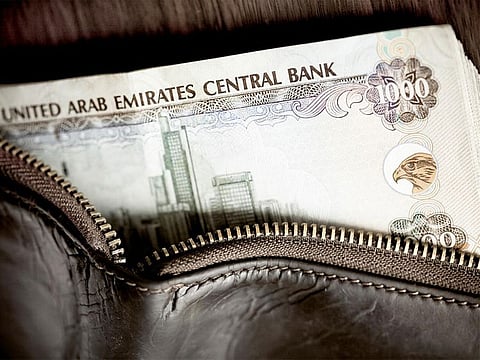COVID-19: How to budget monthly income in UAE after a salary cut
Living carefully can leave you up to 15 per cent in savings

With COVID-19 and the resulting temporary pay cuts, saving extra money can be hard, if not impossible. However, carefully budgeting your income can help you cut back on costs that you didn’t realise were unnecessary. It could even help you in the long run to save even more money when the pandemic situation reverses. The key tip to remember when starting this process is that even the tiniest amount you save can add up and matters.
Here, we have tried to budget monthly income by categories of expenses to keep it applicable for most, if not all, UAE residents. While it may differ slightly based on individual needs - the overall principles should stand true for most residents.
Paying yourself first
For this story we are using a sample salary of Dh10,000 [after a pay cut of 30 per cent] for a small family with one school-going childGulf News
Many expats find saving money one of the hardest things to do. The best way to save, in normal situations, is to adopt a ‘Save First’ plan. As soon as your salary is credited, ‘pay’ yourself a small percentage. However, in the current situation, you may not be able to do that or even know how to start with calculating an amount you could save. If you do think you can save a small amount, most banks have the option to automatically transfer a set figure of your income into a saving scheme established within the account.
To understand how much you can save, let’s start with how much you spend. For this story we are using a sample salary of Dh10,000 [after a pay cut of 30 per cent] for a small family with one school-going child. Budgeting can be done in percentages, starting off with the biggest inevitable expenses before moving on to small repetitive ones. The budget assumes that the family owns just one car for all commuting. This list also assumes that your credit card is only being used for current expenses, and does not include preexisting installment plans or other loan payments.
Rent
There is this universal rule that you should ideally only pay out 30 per cent or less of your income towards having a roof over your head each month. However, several surveys in the UAE have shown that this 30 per cent rule has not applied to most residents for more than a couple of years. A more practical estimate would be 35 to 45 per cent of income for this salary bracket.
Assuming this to be 35 per cent for our example, at Dh3,500 for rent, it is just about enough for a nice one-bedroom apartment in a couple of localities in Dubai. This amount could also get the family a really comfortable one-bedroom or a two-bedroom apartment in Sharjah. Rent is a major factor for people who decide to work and live in different emirates. Once you’ve found your 35 to 45 per cent, you need to go through transport and costs of convenience to know what you can afford, in time, comfort and money.
If you are paying more than this range, you might need to reconsider your living arrangements. Studios and one-bedroom apartments are the most common living choices for smaller families while bachelors tend to opt for shared accommodation, which can get over-crowded, and most of those are illegal.
Transport
After rent, comes the cost of commute to work and other places. Owning a car in the UAE, and those from reliable brands, is easier and more affordable than most countries. However, owning a car comes with extra costs of parking charges, yearly insurance, maintenance, and time lost in traffic jams. A single traffic fine itself can set you back from Dh600 to up to Dh5,000 ruining all your budgeting.
The other option, in this case, is the metro which connects most areas of the city and this is often a sensible choice once you compare the fuel, parking and time costs if you live near a station. However, there are no metro services in Sharjah and Abu Dhabi, so getting a car would be a smart choice if you choose to live there.
For our sample couple, if they decide to reduce rent and live in Sharjah with at least one of them coming to Dubai for work, transport costs can add up to take away the amount saved in rent. For example, if you save Dh500 in monthly rent but end up paying extra for fuel, not to mention hours in traffic, there is virtually no saving. However, if you have company pick-up or use the public transport system, you may actually be saving some money but at the cost of convenience.
Your car loan, parking and fuel payments should ideally be within 15-20 per cent of your monthly income. For our sample couple, that would be Dh1,500 to Dh2,000. If buying a car afresh, you’ll be able to find second-hand cars in mint condition, even with very low driven distance, for at least 10 per cent less. Salik or toll in the UAE is another factor, make sure you know toll free roads to get to places. Only use roads with Salik in case of emergencies because one trip back and forth [with two tolls] could cost you at least Dh16. In a month, that comes up to almost Dh400.
In the bus and metro option, you could be travelling for as low as Dh230 [with prime access to metro stations] or up to Dh1,000 [daily bus and metro ride with occasional cab for two on average]. Anything more than 20 per cent is unwise even in stable financial conditions.
Education
School fees continue to be one of the biggest expenses for many residents. In some cases, expats educate children in their home countries to save on school fees. Fees in the UAE can range from Dh10,000 to more than Dh100,000 on an annual basis across various grades and curriculums.
Spending over 15 per cent on school tuition fees could affect your finances. This would mean Dh1,000 – Dh1,500 for our sample couple, to afford annual fees around Dh12,000 to Dh18,000 for one child. If you can also include bus fees and other school-related fees in this amount, you’re golden. However, most couples tend to spend over 25 per cent at times, including all fees and additional private tuition. Making apt calculations about this amount, which will only increase with time as your child grows or your family does, is critical in deciding where to stay, study or live for the entire family.
Food
Food and grocery expenses can be really affordable if you’re smart about purchases and strict about lists. Our sample couple can easily afford healthy fulfilling meals for less than Dh1,000 in grocery purchases, assuming all meals are home cooked. This would come to 10 per cent of their income. However, choosing where to shop and taking advantage of offers, sales is important to make this happen.
A lot of grocery shops and supermarkets have offers running at some time or another. Get a shopping card for your nearest supermarket which is free and will give you access to great deals. Buy your fish from the local fish markets rather than supermarkets to get fresh produce at great rates. There are certain sale days over the week for different food groups, such as fruits, meat and poultry, grains etc., at some super markets.
Meal prep is also essential for a budget-friendly grocery list. Use weekends to prep meals and make the freezer your friend. Before shopping, have a filling meal because time and again it has been shown that shopping hungry is never good for your wallet. Have a rough meal plan in your mind when shopping and head straight to the aisles you need – super markets have entire teams working to make sure you’re tempted to buy more than what you need.
Given the hectic lifestyle in the UAE, cooking for every meal can be hard. Give yourself a small budget for dining out or ordering delivery. This should ideally be less than 5 per cent of your income if you’re trying to save money – in the sample case, this would be Dh500. Choose restaurants with good offers on credit cards or coupons for certain days.
Sometimes, ordering on the phone saves delivery charges with some eateries, because online aggregators have fixed charges. You will find a good deal if you search hard enough.
Utilities and telecom
Do you really need a 200+ channels or do you just need an internet connection? A basic TV+internet package could cost you around Dh400 a month which includes a landline connection. However, you could get an internet only package for a third of that amount and using YouTube, Netflix, Amazon Prime and other streaming services, you could get all the entertainment and news you need for Dh200 or less.
Your electricity and water bill can come up to Dh800 on average. Make sure you follow authority guidelines to save on electricity and water consumption. Utilities and telecom can come up to Dh1,000 to Dh1,500 each month, at around 10-15 per cent of your income.
Credit cards
You do not need to have more than one credit card. The more credit cards you have, the more the 'false' sense of purchasing power. Paying back your 'minimum amount outstanding' on credit card bills can mean almost 70-80 per cent in financial service fees charged by the banks, bringing no reduction to the principal amount. For example, for many banks, even if you have just Dh100 pending on your bill statement, they charge 2 per cent of your credit limit as fees. If your credit limit is Dh15,000, that fee could be up to Dh300, three times your actual outstanding balance. Call your bank today and ask them what your fee is or read your bank statements carefully
Use cash when possible to put a limit on how much you can purchase. If you have a credit card that gives you rewards or cashback, use that but pay back entire outstanding amounts each month. Even if you use a credit card you can set a spending limit for yourself – don’t go over that limit. In case you feel you’re unable to pay back full outstanding at one point, stop using the card and make sure you keep paying back how much ever you can each month and clear the debt as each month will pile on fees and charges.
Getting a new card is very easy but always remember to ask for those without annual membership fees. Some cards come with a free clause based on spending limits – make sure you’ll be able to meet those before you sign the dotted line. Always ask questions and doubts before getting onboard.
Airplane tickets
Most families go on their vacations as per school schedules while new parents, couples and bachelors have no such restriction. Most ticketing websites offer seasonal promotions or limited deals which you can take advantage of in case you don't have a fixed vacation plan every year. Try online booking as much as possible and scour for coupon codes that can take up to 15 per cent off your total bill. While booking flights, check all merchant sites as well as official airline sites.
Plan your vacations well in advance and fly on non-peak days of the week. We have found Tuesdays to be cheaper than the rest. Try changing your landing/departure destination in the UAE to avail better deals.
Impulse shopping
Making every purchase with a question of needing versus wanting can help control impulse shopping to a great extent. While this should be the case, an occasional shopping treat is an indulgence everyone deserves. Do not whip out your credit card for un-planned purchases. Walk into any store or shop with an idea of what you intend to buy and if something catches your eye, always choose what you need over what you want. If you are in a dilemma over something you want to buy, wait a day or two before buying it. The extra time almost always helps you get to the root of why you need or want the item
Back to Savings
Now that we have laid all the major expenses, we can circle back to paying ourselves some savings. Savings can be routine or for certain goals like buying a car or a house or for educating children etc. Or it could be as simple as making sure you drop your change in a tin can each day. Adding up expenses for our sample couple, here’s what they could save realistically [average amounts based on our estimated percentages]:
Savings 1: Dh500 [as per above list including car payments]
Savings 2: Dh1,300 [metro or bus transport of Dh1000 for two]
Savings 3: Dh1,500 [when using a fully paid off car, paying parking, gas and occasional Salik at Dh800]
This would mean that even if you fall in the first savings category, where you may not be able to save a lot or if you save nothing, you can learn to live more budget-consciously and get to saving so much more when your salary is reinstated. After doing these calculations, keep aside the percentage you can afford first before spending anything.
Sign up for the Daily Briefing
Get the latest news and updates straight to your inbox






